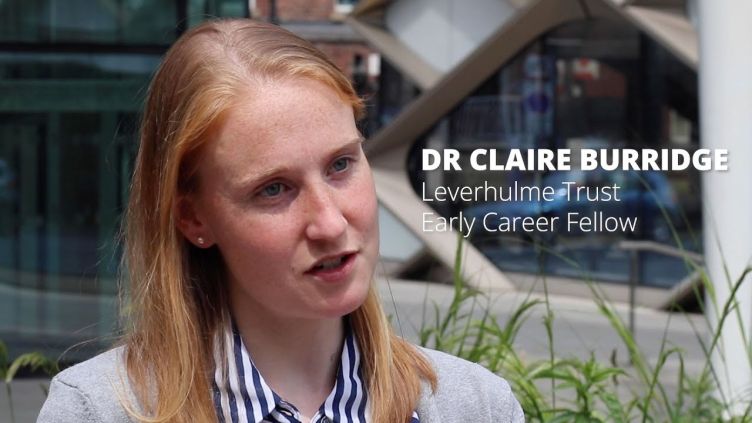Dr Claire Burridge
Dr Claire Burridge, from the Department of History, arrived in Sheffield in May 2021 to begin a three-year Leverhulme Trust Early Career Fellowship focused on the project ‘Crossroads: The Evolution of Early Medieval Medicine in Global and Local Contexts’.

What is your research background and what are your current research interests?
I am a historian of health and medicine concentrating on the early Middle Ages, c. 700-1000. My research focuses on medical recipes – what today we might think of as prescriptions. In my current project, Crossroads: The Evolution of Early Medieval Medicine in Global and Local Contexts, I am exploring the transmission of medical knowledge during this period and investigating how, why, where, and by whom pharmaceutical writings were adapted. The project provides a counterpoint to the traditional focus on the inheritance and reception of classical medical knowledge in the early medieval West, contextualising the evolution of European medicine within both global and local frameworks. I laid the groundwork for this project during my previous postdoctoral fellowship at the British School at Rome and my PhD at Cambridge. While early medieval knowledge transfer may not sound immediately relevant to ISF-related research, I think there are many points of connection. In particular, I’m interested in thinking about the potential ways in which we can learn from past medical knowledge and practices, whether that takes the form of more sustainable and holistic approaches to health and well-being or involves large-scale research into ethnopharmacy in the fight against antibiotic resistance.
Are there any particular projects or outputs of yours that you are particularly proud of or excited about?
I’m very excited about an upcoming workshop I’m co-organising with Dr Neha Vermani, another postdoctoral researcher in the Department of History. Our workshop, Decoding Recipes: Histories of Knowledge and Practice Across Time and Space (to be held in October 2023), will explore recipes as sources and methods for thinking and writing about the past. It showcases recipes from a diverse range of periods, geographies, linguistic traditions, and genres (including, of course, culinary recipes!), and one evening will feature an event open to the public that demonstrates the reconstruction of historic recipes. I certainly hope that the discussions that emerge during the workshop will connect to questions of sustainability, modern applications of historical recipe knowledge, and much more, so watch this space for more details before long!
What do you think are the most high-potential or important future directions for the type of research that you do?
I see great possibilities for future drug discovery research based on premodern pharmaceutical knowledge. Alongside longstanding support for ethnobotanical and ethnopharmaceutical research, we are currently seeing an increase in studies of historical pharmacy with translational potential. Consider, for example, the exciting studies that have emerged from a partnership between historians and biologists in Nottingham. They studied a collection of recipes written in Old English, identified and recreated a possible remedy for Staphylococcus aureus infections located within this text, and, based on their initial results, showed that it is 90 per cent effective against the hospital superbug MRSA (methicillin-resistant S. aureus). While I can’t promise cures for cancer, covid, or anything else, I do think that modern medicine can learn from earlier approaches to health and healing.
What are your links to the Institute for Sustainable Food?
I got in touch with Peter Jackson and Duncan Cameron as soon as I arrived in Sheffield to express my interest in getting involved in the ISF. I was thrilled that they welcomed me on board, especially since, as a medical historian and medievalist, it might not be immediately obvious how my work relates to the research interests of the ISF. Since those initial conversations, I’ve joined the steering committee of the ISF’s ECR Group and have really enjoyed being a part of this interdisciplinary community.
Can you tell us a fun fact about you?
When I was a student, some of my summer jobs included training as a zookeeper at the Durrell Wildlife Conservation Trust and working in a biogeochemistry lab at Duke University – perhaps these varied experiences help to explain why I am always drawn to interdisciplinary research!

